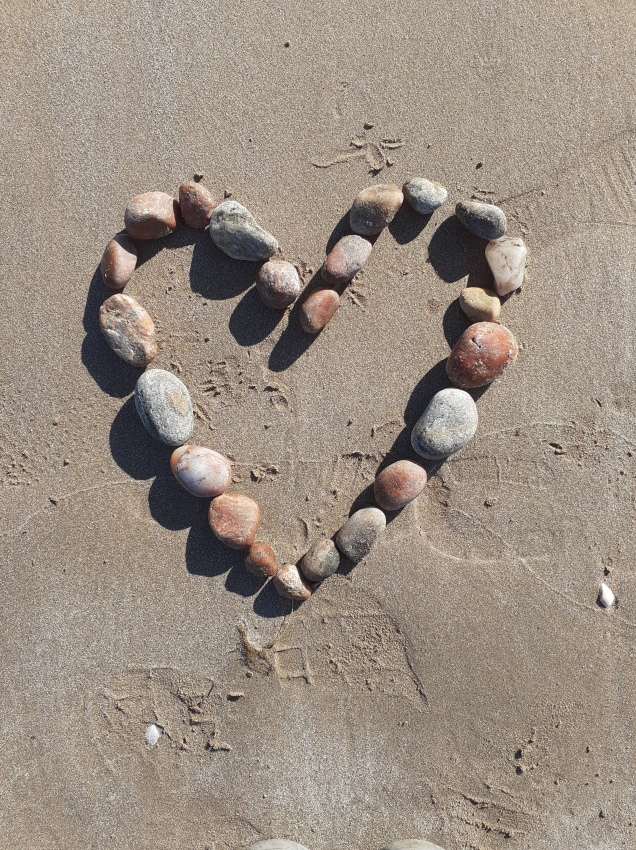I was having a clear out near the start of lockdown and came across something I wrote many years ago after visiting my sister. I wrote it as if I was speaking to my sister, but I never shared it with her.
I feel like sharing it now, not just as a memory of someone who has now gone, but also as a reminder to myself of an important lesson. At the time I wrote the first piece, my sister was in hospital fighting mental illness. She made a partial recovery but in 2018, her health took a turn for the worse and after another spell in and out of hospital, she lost her battle. The second piece, I wrote recently. Both are addressed to my sister.

I had travelled a long way to see you. When I stepped off the bus at the hospital, I felt a bit nervous, but I was glad that for one short afternoon we wouldn’t be separated by land and sea.
You were much thinner than the last time I saw you. You hadn’t been eating. For a moment, I saw fear in your eyes and then you hid it behind a laugh.
We went to the hospital café. I was hungry, but you didn’t want to eat. We talked about the outside world, about what was going on in my life. We went over shared memories. You began to relax a little as we tried to forget that you were locked up in hospital waiting for the day when you’d be well enough to return to your husband and children. From this viewpoint, your present life looked so empty compared to where you were before you get ill, but how do I know what inner journey you are making?
“How’s the food?” I asked.
“Not good.”
“Is there anything you can do about that?”
“Not much.”
I remember the last time I saw you. You were on a rare home visit. Our children were with us, playing happily in the sun, but I wasn’t peaceful. I was thinking of something you had done, part of your illness.
Your son fell and you put your arm around him to comfort him. He stopped crying. It was a moment for silence or for a word of praise, but I wasn’t wise. The words tumbled out, “Why did you do that last night … You need to change … If you keep on like this, you’ll just get sicker.”
You looked at me with astonishment and then you got angry. It wasn’t my business. Why was I going on like this, talking about something which was already history when sunlight was falling on us and you and your son were happy?
In the hospital café, I began to understand that words like ‘Should’ and ‘Why’ are not helpful, but what would I put in their place?
The answer came to me as I walked back with you to the ward. Love. That’s the only word that is important. I told you that you were my closest friend. I reminded you of the times when you helped me, and of how important and precious you are.
“You are the light in your children’s lives,” I said. “The sun wouldn’t shine for them without you.”
I thought then that I saw a glint of hope in your eyes. You wanted to believe this.
A nurse came in to say that dinner is ready.
“I think I might manage to eat something,” you told the nurse.
I put my arms around you and then I left. On my way to the bus stop, I turned around one last time. You were still standing at the hospital entrance, and I saw a brave woman, a heroine, someone who was living with mental illness.

I wrote that years ago. You got better, well enough to leave hospital and live with your family again, to paint, make crafts, go on walks, plant flowers, kiss your kids as they lay down to sleep, give them breakfast in the morning. You were never completely well, but you fought so hard. You did courses, volunteered, even got a job, but the work was too rushed and busy, people in power cutting corners so that they could save money.
If that job had worked out, maybe you would still be here. I could say that about so many little things. If they had gone the other way, maybe you would have had a fighting chance. You kept on going, fought your illness, but you got sick again. By then, the hospital ward where you had stayed before, which had helped you recover, had closed due to government cuts. You were put in a hospital where junkies were dealing on the ward, and where they didn’t have the resources to help people get better. They sent you home, because after changing your medication, there was nothing more they could do for you. The next time you hit a crisis point, you were back in hospital being prescribed a different cocktail of chemicals.
The last time they discharged you, you were still very unwell. You asked for help, seven times, but the message didn’t get through.
You didn’t make it. Not in this life, and I can’t read what I wrote all these years ago without tears. The day you left your family, the sun stopped shining for them.
I could ask why you ended your life, but I won’t get an answer. Maybe you thought we would be better off without you. ‘Why’ is too harsh and hard. I’ll go back to what I learnt years ago, and hold onto the hope that love will get us through this. There’s a saying in Gaelic that love and music will endure. You loved us, and we loved you. The love of you and the loss of you, it’s two sides of the same coin.
And I’ll hold onto that image of you as a brave woman, someone who fought what Alastair Campbell, writing about his brother, calls the shittiest of shitty illnesses. Just because you fell in battle doesn’t reduce your bravery.

And I’ll end here with a quote I found on the internet shared by others who have lost loved ones to suicide. I think it is from ‘The Healing of Sorrow’ by Norman Vincent Peale.
Our friend died on his own battlefield. He was killed in action fighting a civil war. He fought against adversaries that were as real to him as his casket is real to us. They were powerful adversaries. They took toll of his energies and endurance. They exhausted the last vestiges of his courage and strength. At last these adversaries overwhelmed him. And it appeared that he lost the war. But did he? I see a host of victories that he has won!
For one thing — he has won our admiration — because even if he lost the war, we give him credit for his bravery on the battlefield. And we give him credit for the courage and pride and hope that he used as his weapons as long as he could. We shall remember not his death, but his daily victories gained through his kindnesses and thoughtfulness, through his love for family and friends, for animals and books and music, for all things beautiful, lovely and honorable. We shall remember the many days that he was victorious over overwhelming odds. We shall remember not the years we thought he had left, but the intensity with which he lived the years he had!
Only God knows what this child of His suffered in the silent skirmishes that took place in his soul. But our consolation is that God does know and understands!




